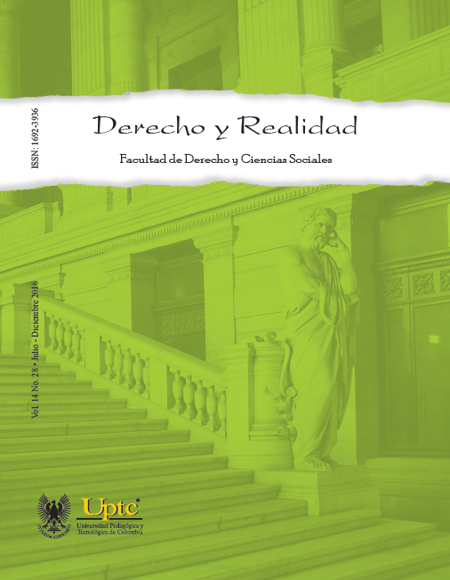Human Rights and Indigenous Linguistic Rights of Colombia

Abstract
The purpose of the article is to contribute to the debate on human rights an approach to their relationship with linguistic rights in the indigenous peoples, based on the question: What is the relationship between human rights and linguistic rights in the villages? indigenous people of Colombia? The methodological design for the project takes, from anthropology, the ethnographic method, which has been used by the discipline to study the way in which norms, ideas and human rights discourses are addressed by social actors. It is evident that it is necessary to incorporate an intercultural knowledge dialogue into the debate. It is concluded that, although the native language is an essential part in defining an indigenous people, by historical situations not all peoples have retained their language, yet they must exercise their right to defend it.
Keywords
linguistic rights, human rights, transitional justice, indigenous people, subject of human rights.
References
- - Angarita, Carlos E. Estado, Poder y Derechos Humanos en Colombia. Editorial CÓDICE LTDA. Bogotá, 2000
- -Estévez López, Ariadna. Construcción de sujetos (des)empoderados a través del/de los discurso(s) de derechos humanos. Norteamérica. Año5, número1.2010
- - Fernandéz Liesa, Carlos R. Marco Jurídico internacional de los derechos lingüísticos. Universidad Carlos III de Madrid. Boletín oficial del Estado, Edición: José María Sauca - Lenguas, política, derechos. Madrid 2000
- -May, Stephen. Language and minority rights: ethnicity, nationalism and the politics of language. New York: Routledge, 2011.
- -Organización indígena Kankuama OIK Makú Jogúki: ordenamiento educativo del pueblo indígena Kankuamo. Valledupar:2008
- -Pineda Camacho, Roberto. El derecho a la lengua: una historia de la política lingüística en Colombia. Uniandes. Bogotá: 2000
- - Sklttnabb—Kangas, T., Y Phillipson, R.: Linguistic Human Rights, Past Andpresetzt. En Skutnabb-Kangas Y Phillipson (Eds.), 1994
- - Walter Mignolo: The Darker Side of Western Modernity: Global Futures, Decolonial Options. Duke University Press, 2011
- Tesis
- - Lovich Villamizar, Verena.Educación intercultural bilingüe (EIB), una visión comparada entre Ecuador y Bolivia, 2001-2006. (Tesis de pregrado). Bogotá: Universidad Externado de Colombia: 2010.
- Artículos
- -Green Stocél, Abadio. La educación desde la Madre Tierra: un compromiso con la humanidad. Artículo del proyecto de investigación: “la lucha de los siete hermanos y su hermana Olowaili en defensa de la Madre Tierra: hacia la pervivencia cultural del pueblo Tule”. 2006-2007
- -Rojas Quiñonez, Claudia María. La diversidad lingüística en Colombia: protección jurídica de las lenguas indígenas. Artículo. Revista Pensamiento Jurídico N° 22.
- - Gröll, Ilse. Montes Rodríguez María Emilia. Pappenheim Murcia, Ruth; compilador, Daniel Aguirre Licht. Las lenguas autóctonas en Colombia: consideraciones alrededor de su legitimación en la constitución de 1991
- - Pavón Marta. La recuperación de lenguas nativas como búsqueda de la identidad étnica. Universidad de los Andes CCELA,
- Páginas de internet. Bogotá:1995
- -Documentos para la historia del movimiento indígena colombiano contemporáneo. Ministerio de Cultura. Bogotá 2010-08. http://www.banrepcultural.org/blaavirtual/biblioteca-indigena colombia/documentos-para-la-historia-del-mov-indigena
- - http://www.linguapax.org/castellano
- - www.onic.org.co
- - http://siemenpuu.org/es/theme/buen-vivir-0